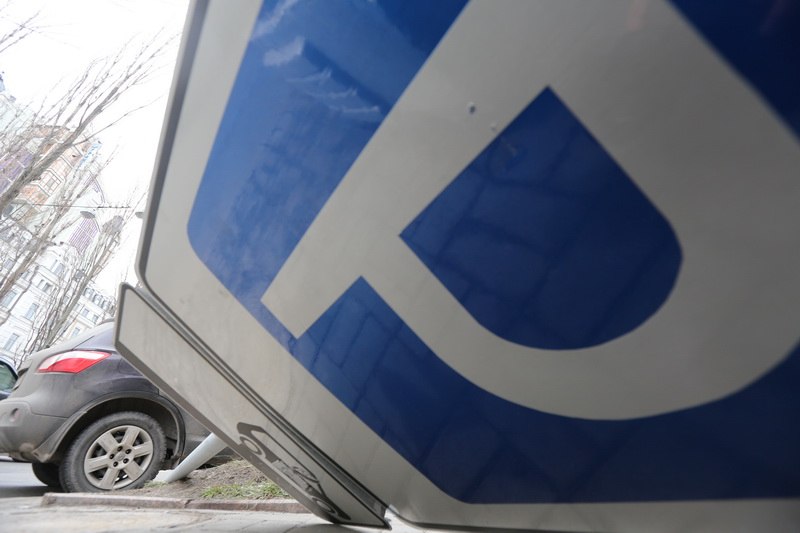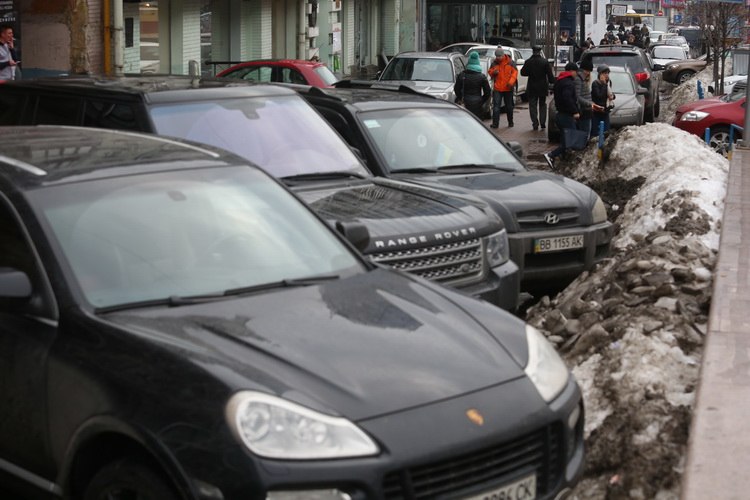Kyiv, like a lot of old European capitals, just wasn't built for cars.
Although it had, until recent years, one of the best public transport systems of any big city on the continent, the huge increase in car ownership over the past two decades of independence has caused Kyiv’s city center to regularly become clogged with traffic. And when the cars stop moving, they do so on sidewalks.
The paring back of the once-extensive tram and trolleybus system has only added to the problem, reducing public transport options and freeing up road space – for even more cars.
Private “marshrutki” or minibuses have flourished in tandem with the decline in above-ground public transport, but they only add to traffic congestion.
City Hall is failing to cope with the city’s traffic problems, even though tried and tested solutions exist.
Patrol police
In the meantime, there’s finger-pointing going on: Kyiv Mayor Vitali Klitschko said on Jan. 26 that the capital’s patrol police are not doing their job well enough.
“How many … meetings have we got to have with the patrol police?” the mayor complained. “Cars are still mostly illegally parked as they were before. At the same time, underground parking spaces remain empty. Why is no one parking there? It’s because you can park your car wherever you want and nothing will be done about it.”
That’s not strictly correct: since Nov. 7, when the police were officially given the power to tow cars, more than 2,000 illegally parked vehicles have been towed off and impounded in Kyiv.

Kyiv Mayor Vitali Klitschko blames patrol police for not being harsh enough against illegal parking in the capital. But the police say it is impossible for them to fix the problem on their own and that they are doing what they can. Since Nov. 7, only 2,034 cars have been towed because of illegal parking. Source: Patrol Police of Ukraine
But Oleksiy Biloshytskiy, the deputy head of Ukraine’s patrol police, says all big cites in Ukraine suffer from parking problems like Kyiv’s, and that police can’t fix the situation by themselves, as illegal parking is not the only problem they confront.
“The problem is complex,” Biloshytskiy said. “You can’t just say that there are not enough parking lots, or that drivers are just violating parking rules.”
Better-worded legislation that gives more powers to the police would help, Biloshytskiy said. Under current law, police cannot ticket a parking violator without the presence of the driver if the violation does not significantly obstruct traffic. The police either have to wait for the driver to appear to be fined, or record the violation on camera.
“There should be more cooperation between the legislative branch, the city government and the police in order to overcome this multifaceted problem,” he said.
The approach is very different from such countries as the United States, where parking-enforcement officers are employed who have no other responsibilities other than issuing tickets to parking violators.
Missed opportunities
Serhiy Kharchuk, a member of the city’s transportation and advertisement commission, says that the capital has missed a number of opportunities to solve the problem.
“The problem is that some of our top politicians, including mayors, did not consider Kyiv and Ukraine in general as a country to live in,” Kharchuk said. “I get the impression that some of them would like to make a quick profit, squeeze money from the state budget, and then go outside of Ukraine (to live) somewhere else.”
One example is the Metrograd Mall in Kyiv’s center, which was completed in 2005 when Oleksandr Omelchenko was mayor. The original idea was to have an underground car tunnel, but this plan was canceled due to greedy investors, Kharchuk said.
Today’s Kyiv infrastructure is inadequate for the metropolitan area’s 3 million residents.
Bespalov says 600,000 private cars use Kyiv’s roads every day, and that doesn’t include visitors or transit traffic. There is an enormous mismatch between parking space demand and supply, since there are no more than 18,000 official parking spaces in Kyiv belonging to state-owned company Kyivtransparkservice.
Corruption

The human factor is one of the main reasons why Kyiv’s parking system is dysfunctional and corrupt. Cash paid to the ticket person presumably moves up the corrupt pyramid structure all the way to top managers. This, in turn, robs the city’s budget. (Volodymyr Petrov)
And that company, like so many other government-owned ones, is poorly run.
Kyivtransparkservice “is an enterprise that normally shows losses instead of profit,” Kharchuk said. “Every single day more than Hr 1 million – I am talking about black cash – goes into private pockets.”
Kharchuk wants to get rid of the human factor in Kyiv’s parking system by installing more parking meters. “Otherwise it will be an endless story, it will never stop,” he said of the corrupt pyramid structure that moves money collected from the streets to, presumably, managers with greater authority.
“There’s going to be a real fight,” Kharchuk said. “Can you imagine that anyone will just agree to lose millions and millions of black cash that they don’t pay tax on?”
Since Klitschko took over running the capital, there have been at least four different heads of Kyivtransparkservice. The newest head, Artyom Shamray, came into office on Feb. 5 through a reportedly open selection process. Representatives of Kyivtransparkservice said they were unable to meet for an interview with the Kyiv Post as they were not able to comment until Shamray presents his new administrative plan.
Bespalov says that the enterprise could make roughly Hr 300 million (about $12 million) a year, instead of losing money, as it did in 2015. According to the latest publicly available figures, Kyivtransparkservice’s loss in the first nine months of 2015 was Hr 444,000 (about $17,760).
Hryhoriy Melnichuk, a road safety expert and the coordinator of Kyiv Urban Council, a non-profit organization, says that another form of corruption is seen at parking lots, where the amount of parking space is underreported. If the parking lot, for example, is built for 20 cars but in reality 30 cars are squeezed in, then managers only report 20 cars, and pocket the money from the undeclared 10 cars.
Cutting out the human factor will make it much more difficult to steal money from the city’s budget. “The city can collect this money directly, as is done in Germany, Austria or in Switzerland,” he said.
Lawmakers must act
A car is
parked on top of a toppled parking sign in Kyiv’s center. (Volodymyr Petrov)
Kharchuk is waiting for parliament to act.
Samopomich Party member of parliament Ihor Didenko, who is a co-author of a proposed bill on parking, thinks that new legislation will pass soon. It would eliminate the human factor and would provide clear parking rules in addition to other reforms. However, the legislation will not change the police’s responsibilities.
“I think that it will take one or two months, and then it will pass,” Didenko said.
Didenko says that he has the support from most of the parliament and the city’s administration.
Post-Soviet mentality
For many Kyiv residents, using a car in the center is not necessary.
Kyiv’s parking rules are unclear prompting drivers to park on pedestrian sidewalks. (Kostyantyn Chernichkin)
Cars are just a status symbol, Kharchuk said. “It’s not only the lack of parking places, but the mentality that also has to change. It has to be a combination of punishment and education.”
Bespalov says that almost 90 percent of the time Kyiv residents use their car rather than cheaper public transport.
“We need to understand that parking is not a way of punishing drivers,” Melnichuk said. “Instead, it creates a better economy, an opportunity to park for those who need it the most and a way to regulate traffic movement.”


